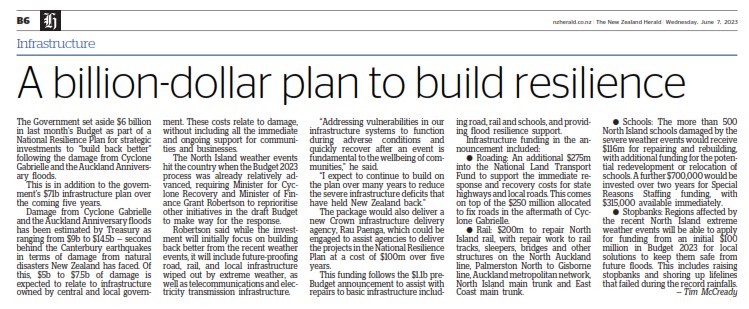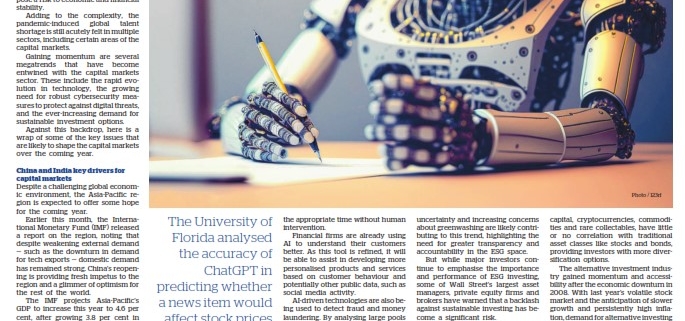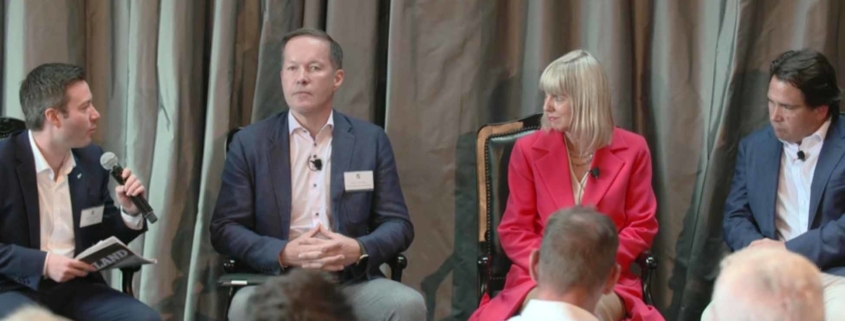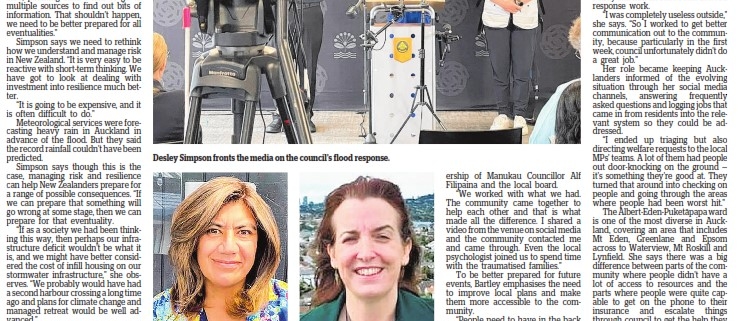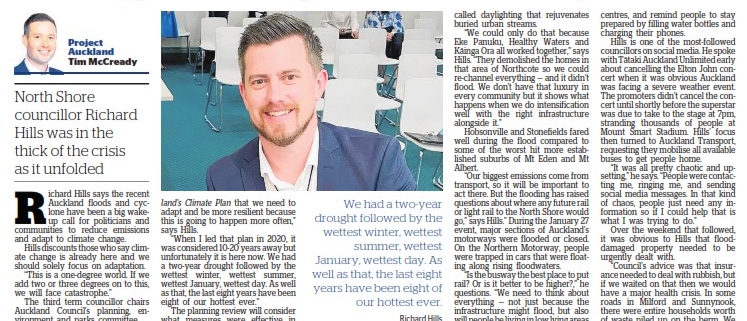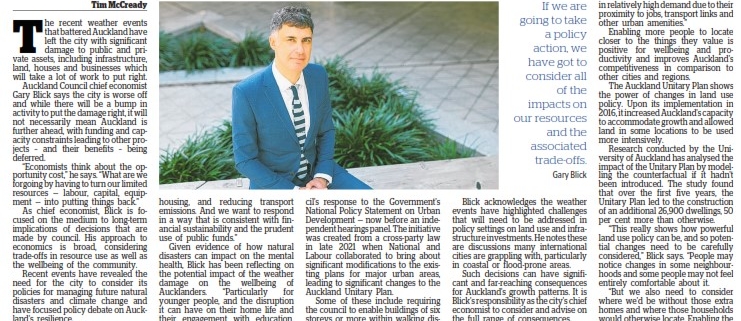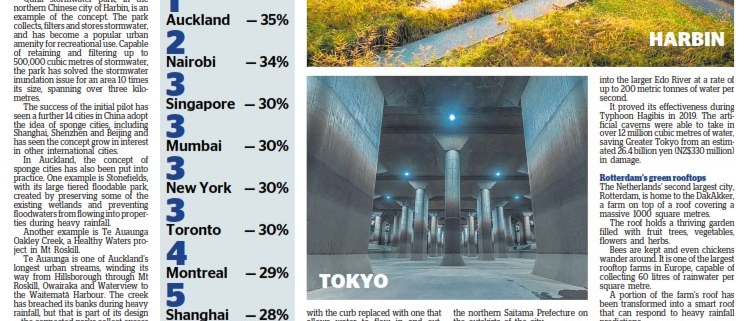Simpson says we need to rethink how we understand and manage risk in New Zealand. “It is very easy to be reactive with short-term thinking. We have got to look at dealing with investment into resilience much better.
Meteorological services were forecasting heavy rain in Auckland in advance of the flood. But they said the record rainfall couldn’t have been predicted.
Simpson says though this is the case, managing risk and resilience can help New Zealanders prepare for a range of possible consequences. “If we can prepare that something will go wrong at some stage, then we can prepare for that eventuality.
“If as a society we had been thinking this way, then perhaps our infrastructure deficit wouldn’t be what it is, and we might have better considered the cost of infill housing on our stormwater infrastructure,” she observes. “We probably would have had a second harbour crossing a long time ago and plans for climate change and managed retreat would be well advanced.”
Simpson says there are a lot of LIMs (land information management reports) in Auckland that show a risk of flooding. But planners have not been inhibited from increasing housing density, even though the risk shows the density sometimes exceeds infrastructure capacity.
“I think there is a real risk around that, and from my personal perspective, I’d like to put a stake in the ground and say ‘hold on — let’s stop’.” She suggests a “digital twin city” model could be a possible solution to help with future planning. This is where a digital computer model of a city simulates how urban upgrades would impact water flows, traffic and provide other intelligent feedback.
Because everyone shares the same data, a digital twin city would also allow service providers to share data and ensure that work is co-ordinated.
During the devastating floods, Josephine Bartley realised the severity when she was inundated by messages on social media from community members whose homes were being filled with water, and who had no idea what to do or where to go.
“I was being sent videos of people swimming in the street, and even though they only know me through Facebook, they thought I might be someone who could help them.
“They were scared, and I was scared. But I was trying to be strong for them, to give them direction to get out of their homes.”
The second term councillor for Maungakiekie-Tamaki quickly emerged as a powerful voice — not just for her own ward, but for other parts of Auckland — particularly those with a high proportion of Pasifika residents.
She says that while south Auckland residents were poorly supported by official channels and in some cases couldn’t be reached by emergency services, communities came together to help one another.
Bartley went to the Māngere evacuation centre, set up under the leadership of Manukau Councillor Alf Filipaina and the local board.
“We worked with what we had. The community came together to help each other and that is what made all the difference. I shared a video from the venue on social media and the community contacted me and came through. Even the local psychologist joined us to spend time with the traumatised families.”
To be better prepared for future events, Bartley emphasises the need to improve local plans and make them more accessible to the community.
“People need to have in the back of their heads: ‘if this happens, we go here’. We have to get to the stage where people don’t rely on emergency services but will be ready to help their own family immediately.”
She points out that Civil Defence and bureaucracies often fail to understand the unique needs of specific communities. Providing an empty building as an evacuation centre is not enough and doesn’t account for the different cultural and social requirements that are needed in the community.
Bartley’s leadership caught the attention of international media. While still based at evacuation centres, Bartley spoke with international outlets Fox News, BBC World News, Pacific Media Network and others, sharing updates on the emergency situation in Auckland and insights into the ongoing community efforts.
Julie Fairey — Councillor for Albert-Eden-Puketāpapa
During the floods, Julie Fairey was unable to leave her house — she had three children at home and a broken arm which made driving and lifting things impossible.
But as one of the two representatives for Albert-Eden-Puketāpapa, Fairey still had an active role in flood response work.
“I was completely useless outside,” she says. “So I worked to get better communication out to the community, because particularly in the first week, council unfortunately didn’t do a great job.”
Her role became keeping Aucklanders informed of the evolving situation through her social media channels, answering frequently asked questions and logging jobs that came in from residents into the relevant system so they could be addressed.
“I ended up triaging but also directing welfare requests to the local MPs’ teams. A lot of them had people out door-knocking on the ground — it’s something they’re good at. They turned that around into checking on people and going through the areas where people had been worst hit.”
The Albert-Eden-Puketāpapa ward is one of the most diverse in Auckland, covering an area that includes Mt Eden, Greenlane and Epsom across to Waterview, Mt Roskill and Lynfield. She says there was a big difference between parts of the community where people didn’t have a lot of access to resources and the parts where people were quite capable to get on the phone to their insurance and escalate things through council to get the help they needed.
“A lot of our response was about how we direct resources. Councillors Josephine Bartley and Angela Dalton got in touch several times to say they had some resources they could share, or to connect people up with relevant community groups on the ground that could check on people or provide supplies or emergency accommodation.”
To improve the council’s preparedness for future events, Fairey stresses the importance of improving its emergency management communications. “That was apparent on the day of the event, but also after.”
She says the council’s communication system with elected members during the Covid pandemic was a good example of effective communication. This provided regular updates with critical information, ensuring everyone was kept informed and that communications were aligned.
“After the floods it took too long for that system to reactivate,” Fairey says. “It is widely acknowledged that we should have that ready to go — maybe not right away when we don’t know how severe things are — but within the first 24 hours.”
Fairey says the flooding demonstrated elected members can be a great asset to get information out to residents. “But we can only tell people what we know.
“After a couple of days there was an acknowledgement that we were not in the way, but we were a very useful communications channel.”
‘Big Auckland Fix Up’ under way
A comprehensive emergency recovery plan to help rebuild the region and better prepare Aucklanders for future weather events is under way.
“It’s been more than a month since our region was hit by a horrible one-two punch – the Auckland Anniversary floods and then Cyclone Gabrielle and we still have a lot to do to help our hardest-hit communities,” said Auckland mayor Wayne Brown, who has labelled the plan the Big Auckland Fix Up.
Brown has asked Auckland Council CEO Jim Stabback to initiate a rapid assessment of flood risk areas to identify simple fixes and then carry out the necessary programme of work in consultation with Watercare and Auckland Transport.
He’s also tasked local boards to identify five main trouble spots and fixes in their area.
Brown then plans to visit these sites with relevant engineers to progress work. The mayor has identified several simple fixes to reduce flooding risks:
1. Clear streams and open drain channels on public and private land.
2. Lower non-arterial roads over constricted drains and waterways.
3. Build and improve turn-offs to utilise public stormwater storage in public parks and other areas.
4. “Daylight” streams in places where they are enclosed in pipes or narrow paths to create floodplains and reduce flooding of residential areas.
Brown says it’s obvious that Auckland must get better prepared for severe weather events and needs to rebuild local capabilities and response plans that have fallen into disrepair over the last six years and look at how we forecast and model flooding so we can provide better intelligence to the public.
“We need to restore and rebuild our broken roads, bridges, water system and buildings in a way that will make communities stronger and more resilient, and we need to address land use planning and building regulations.
“Recent events exposed problems in where and how some houses have been built in Auckland. In some cases, the government or courts have constrained council’s ability to regulate, and this will need to be addressed. The council must be able to say no and plan for infrastructure, as managed retreat is a last resort option.”




